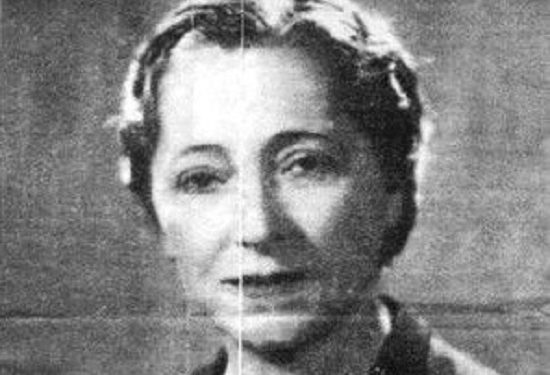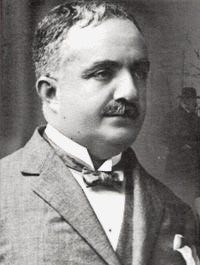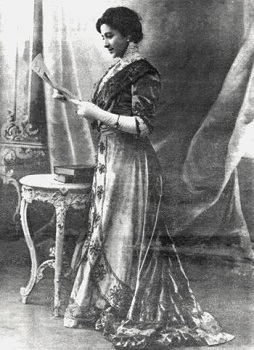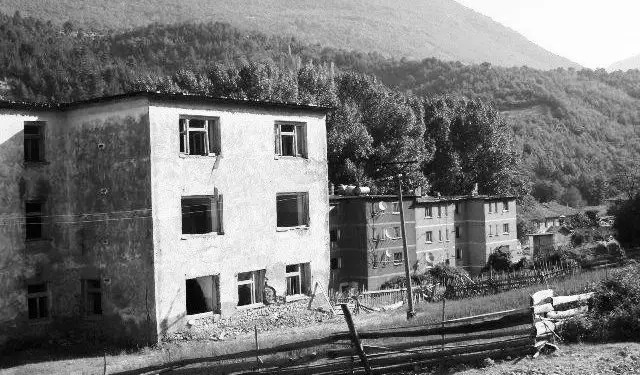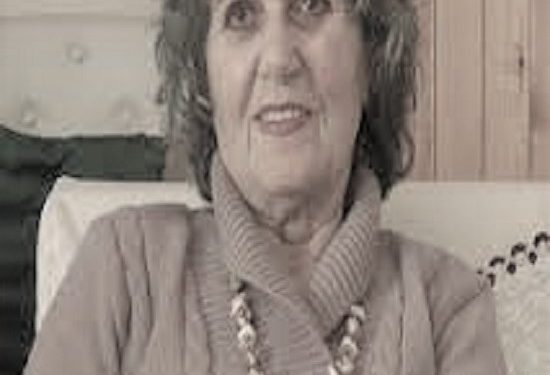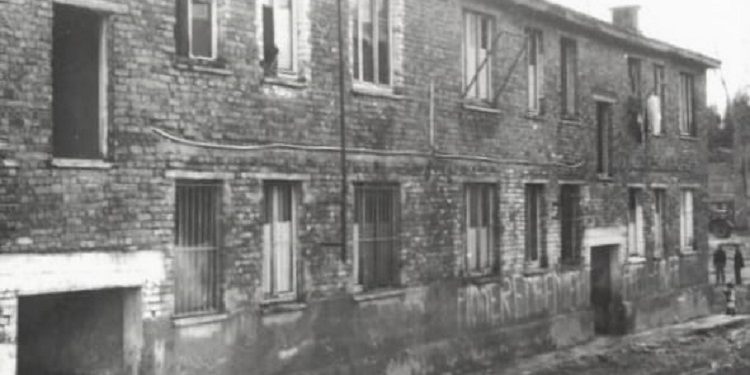By Ermira Isufaj
Memorie.al / The rare story of the Danish woman, raised in Parisian society, in love in Istanbul with the Albanian Myfit Libohova, the former Minister of the Interior of the first Albanian government of Ismail Qemali, ends in Albania, haunted by persecution, exile generation after generation. Olga Schweizer, even after the death of her husband, did not leave Libohova, the village where she decided to live, setting up one of the rare events, how she saved 100 men from German shooting in 1944. If there is a story, that should have grabbed the nerve of any writer here, it would undoubtedly be that of a Danish-born woman named Olga Schweizer. A young girl, raised in the worldliness of Paris, but that fate brought her around: from Istanbul to Tirana, in the latter, resting the bones forever with a sublime sacrifice, more than a love story.
Olga Schweizer, from Istanbul to Libohova
The young Ollga, a talented girl in the piano, falls in love with the Albanian Myfit Libohova, one of the signatories of Albania’s independence. This story is rare. During his studies in Istanbul, Ollga met the Albanian and his love for him made him come to Albania in 1909. Myfit Libohova was appointed in the first government of Ismail Qemali as Minister of the Interior and later Minister of Foreign Affairs and Finance. Although Libohova “interrupted” the love story in 1927, the year she died, Ollga did not leave Albania. She stayed in Libohova, where she was honored and respected by the whole village.
While after this woman, Fatbardha Saraçi in her book “The Calvary of Women in the Prisons of Communism”, – where the lives of women who suffered and how they resisted the tortures of the dictatorship are gathered, – tells us an unknown, rare episode in terms of selflessness. We devote a special dedication to reawakening not simply the sensibilities of foreign women, as ladies in love with their husbands or, as memories are often attributed, as educated and worldly ladies; – this kind of impression reverses the events, when the story comes merciless on either side.
This story is related to the year 1944, when the Germans surrounded the village of Libohovo and pulled over 100 men to be shot. Ollga, now a Libohovite, enters among them, whom the Germans wanted to shoot at the big maple, in the center of the village. She threatened the officer that if he was going to kill the men, he would have to shoot him first.
“As a result of the intervention of the Danish woman, who spoke German, 100 men were saved from death, while the punishment for harboring partisans was the burning of the village, but life was considered more important”, Saraçi writes in this memoir. Then, with the establishment of the communist regime, for Olga and her family, in a paradox of history, the ordeal of suffering, punishments and persecution begins, until 1990, when the last successor, the young Myfiti, shows how he did not stop pursued by the State Security.
The story of Fatbardha Saraçi, about the history and ordeal of the Libohova family
“Whenever I was traveling on the Shkodër – Tirana line, when the bus approached the village of Zejmen (Lezhë), by the highway, in the village cemetery, you could see a grave, with a square base, made of cement; there lay a foreigner, who had been interned in this area. Every spring the plum blossomed, with a crooked trunk, which was at his head, and the white flowers of the tree awakened memories, of a life full of suffering, of a stranger. Her name was Olga Schweizer-Libohova, she was born in Denmark. Her father was a soldier, they lived in Paris. Ollga, as a young girl, was fond of art; she continued her piano studies and her father sent her to Istanbul. In Turkey, she fell in love with the Albanian Myfit Libohova, her great love for him made her come to Albania in 1909.
This honorable lady was the wife of Mr. Myfit Libohova, former Minister of the Interior, of the first Albanian government, of Ismail Qemali, and later held the position of Minister of Foreign Affairs and Finance. They had a son named Elmaz. The love story was interrupted by the death of her husband in 1927. She did not leave Albania, but stayed in Libohova and all the villagers loved her, respected her and called her a member of their village. In 1944, in the German June Operation, she was brave; she entered among the hundred men that the Germans wanted to shoot at the big maple tree, in the center of the village. She threatened the officer that if he killed the men, she would have to shoot him first. As a result of the intervention of the Danish woman, who spoke German, 100 men were saved from death, while the punishment for harboring partisans was the burning of the village, but important were human lives, the most precious in life, life.
But in 1945, by order of the major soldier, Petrit Dume, the Libohova family was taken out of the house, everything was robbed, while the library’s books with 2,500 volumes and many historical documents were burned in the middle of the village. Olga was decided to live in a cowshed. In this year, he was exiled to Shijak. Her son, Elmazi, who was continuing his studies there, returned from Italy, hoping for an improvement in the situation, but he was arrested on three baseless charges: “attempt to escape, agitation and propaganda against popular power and formation of a hostile group”. They sentenced him to eleven years in prison (deprivation of liberty), after he tried the torture in the investigator. In 1949, she was exiled to the village of Tresh in Lezha, alone, without any vital income. He worked on the farm and loneliness followed him everywhere, loneliness in communism.
He lived in the village of Tresh, in a hut, next to the road, next to the pigsty. Her son tried communist prisons and labor camps, when he was released he joined exile with his beloved mother, after eleven years of separation…! Olga’s son was working in the fields, with blood pressure of 28, while in December 1963, the Albanian Dane, at the end of the year, closed her eyes for life, there in exile. Mother Ollga’s son also spent his life in exile, where he lived with his wife, Myzafera, who was a wonderful friend who accompanied him in those years of suffering and pain. From this marriage, three sons were born in exile: Enveri, Qemali and Myfiti (the young man) who were born and grew up with the label “children of the declassified”, “enemies” and “traitors”.
In the communist system, misfortune would follow this family everywhere. They arrest the mother of three children, Myzafere Libohova, for allegedly speaking, doing agitation and propaganda, with false witnesses, with untruths, with lies, they sentence her to five years in prison, deprivation of liberty.
The family was left without the lady of the house, while Elmazi, from the hard work and the shock he suffered from keeping the woman in the interrogator and her punishment, passed away, died in that period that the mother of his children was sentenced. At his funeral, there were only two cousins, Ihsan and Servet Libohova. The persecution continued even among the children, who were not equal to other children, they were branded from their birth with the epithets “declassed”, “enemies”…!
Myfiti (the young man) says: “From 1985-1987, I was detained twice by the State Security. In 1990, the climax was reached. I was arrested by the Director of State Security, Zef Loka, who for a month followed me everywhere with his subordinates and men. I did not know what to do with me? I only heard that they had it with us, with that stratum that presented problems for the government at that time. I don’t know how I escaped from that “dance” of death. Every time I remember that time, I can’t get the bad smell out of my mind, there in exile…! I married my wife on Friday, contrary to our custom, while on Monday, I boarded the plane to Austria, I left the Motherland forever…”! The young man, Myfiti, returned to Albania in 2001, carried the remains of his grandmother Ollga and his father, Elmaz, from Zejmeni i Lezhës, to the hills of Tufina in Tirana. Now they rest in peace without the barbed wire of the internment camps of socialist Albania.
After luxury and mundane salons, the life of the Danish-born countess would take an unexpected turn after her marriage to the former Minister of the Interior, Myfit bey Libohova. The internment in a pigsty and the decision not to leave Albania, even after the death of her husband… A story of unparalleled love and loyalty closely related to our country. Madam Ollga’s remains are still resting today in Tufinëst Cemetery
For him, the residents of the area tell stories that resemble legends. Stories that remind you of the subjects of Ismail Kadare’s novels. The “Wrong Dinner” comes to mind, the hostages rescued, but this time by a Danish woman. It is about Countess Ollga Schweizer, married in Albania to the former Minister of the Interior, Myfit bey Libohova. The graceful woman, who would remain a widow after 19 years, would suffer years of exile and family persecution. He would be forced out of the house by order of Petri Dumas, to live in a hut near a cow stable in Shijak. The jobs assigned to him were from the most mundane, from cornfields to cleaning the stables. Then, the difficult and poor life, together with the only son born from this marriage, would follow her in the second exile, in the village of Tresh in Lezha, where she closed her eyes, to be buried in in 1963.
One of the witnesses who knew her closely, Fatbardha Saraçi Mulleti, tells about the unexpected meeting with the countess, who was sitting at the door of the hut, covering her nose with her hand, due to the strong winds of the nearby stable, while her son, returned from his studies in Italy, he did side work in agriculture and, not only. The villagers of the surrounding area show her a generous woman, who, even though she was poor, shared the few things with the families nearby. Ollga Libohova, was Albanianized to the grave, not abandoning for a single day the place with which she tied the knot with her feelings, along with her life. Just a few years ago, the grandson of the family exhumed the remains of grandmother Ollga, to bring them closer to the Tufina Cemetery, where they rest to this day…!
Mrs. Fatbardha, what is your relationship with the Danish Countess Ollga Schweizer?
It is a very impressive story that of the Danish countess, Ollga Schewizer, who took the surname Libohova, after marrying the personality of Albanian politics and state, Myfit Bej Libohova. I got to know her life in detail, not only for study effect, but also for the fact that I met her up close, I got to know her personally, and later, mostly through her grandson, Myfit Bey i Ri. Since she was the daughter of a rich family, her father was a high ranking soldier, while her mother was from the layers of the Danish aristocracy; every wish of Olga was an order for her parents. Therefore, after liking art and music in general, his father sends him for specialized studies for the piano instrument, in Turkey, the place where he would meet the Albanian Myfit bey Libohova, with whom he fell madly in love, until he decided to marry and be forever connected with Albania.
Under what conditions did you know him?
It was 1959…! Even though I was expelled from my family, as the granddaughter of Qazim Mullet, the need for teachers meant that, even though we were persecuted, we were assigned to different places to teach, naturally those who had finished high school, as in my case. And that year I was assigned to the village of Tresh in Lezha, where I worked for around 17 years. I was a biology teacher and that day, we had gone with the students to see closely some farms, cow and pig stalls in the area, with the aim of seeing how they were raised, the food, etc. I was immediately very impressed by the hut next to the stables, at the door of which a tall, gracious woman appeared to me, to whom I shook hands. I will never forget the portrait and holding my nose from time to time because of the heavy and strong smells that the pig stalls have. He did not live in luxury, and yet he did not remove the smile from his face.
What did the countess look like?
She was a charming woman who, despite her age, had not lost her aristocratic manners. Neat and loving with the villagers of the area, with whom she was very charitable. She was given food and clothing from her own and her son’s, and this detail was later told to me by several families who had lived with her, until the day she died. Of course, that day, we didn’t exchange long conversations, I just learned her name, as she spoke Albanian, and explained some facts about why she was in that hut, alone, after her son was sentenced to 11 years of imprisonment freedom. She suffered the death of her husband, at a very young age, as she was from Libohova, he passed away in 1927, only 19 years after their marriage. Ollga was his second wife, after the first had died.
She didn’t leave after her husband’s death?!
Although her husband died at a young age, she did not leave Albania. Initially, she lived in her husband’s village, in Libohova, where everyone called her “Madam Ollga” and had special respect for that woman. She was tribal not only in her genes, but also in her character, in the way she made people her own, with her sweet words, with her low voice, with the kindness she showed, asking them not for alms, but for things, clothes and food, from her house. In more detail, the real life and the events that followed for Olga, I got to know later, after meeting my nephew, Myfit Beu e Ri, who suffered at the back, a real ordeal of family persecution.
The stories related to the life of this woman almost resemble legends…?!
It is a story that is told almost like a legend, even though it has been many years since it happened. Just like the stories that grandmothers tell, but in the case of the Danish countess there is absolute truth, and this fact was told to me by my grandson. It was 1944 and in the June Operation, the German occupation forces had written to the village of Libohova to shoot about 100 men. The German forces had entered the village to check for partisans, and since Ollga knew the German language, he assured the officers that; there were no more partisans in the village.
But they did not obey and lined up 100 men at the plane tree. Ollga told the officers that, if they were going to shoot at those men, they should first kill him…! And so, they escaped being shot. Someone else from the Libohovits had spied that in a house in the village, there were some partisans who were supported by their families with bread and water and, the next day, the German forces returned and set fire to the houses in the village.
What happened next to the countess’s family?
What followed was the real hell of the aristocrat’s suffering. In 1945, by the direct order of Petri Dumas, the Libohova family was forced out of the house, confiscating all their possessions, one of which was the family library, for which an order had been given for all the books to be taken out into the field and to be used to help burn firewood, while the women of the village boiled the kettles with clothes to wash. Ollga and her son were exiled to Shijak, placed in a cow stable, where they stayed for more than five months. In the midst of scarcity, Ollga was forced to do any manual work that was assigned to her, and one such was both cleaning the stables and gathering corn in the field.
He never complained about fatigue or hardship, his son said. She was not afraid of work and every day she went to work without laziness, just like other women who had a similar fate to her. She sweated profusely and she toiled in hard work, which she probably never thought she could ever do, knowing her aristocratic roots. It was a difficult life, with his son who had a hard time acclimatizing, with the strong smells of cows and stables. But, she still took care of the place where she lived, cleaned it, arranged it nicely, even though she lived in conditions of extreme poverty.
What about the son?
The son, Elmazi, who was studying in Italy, a few years later, after completing his studies, in 1949, returned to Albania, with the idea that things could have changed a little or improved somehow. On the second day of his stay at the hotel, he was arrested on charges of escape and agitation and propaganda. They sentence him to 11 years of imprisonment. In the same year, Ollga was exiled to the village of Tresh in Lezha, alone and in extreme poverty. Again, fate had played badly with her, and yesterday’s countess was assigned to live in a hut near a stable, where pigs were raised. While the forced work was in agriculture and cleaning stables. Ollga did not see her son again until the day he finished his sentence, a full 11 years.
When did you find out what happened to Mrs. Ollga?
It’s strange how I reacquainted myself with the story of the Danish countess…! Every time I traveled on the Shkodër-Tirana line, when the bus approached the Lezha cemetery, by the highway, there was a magnificent grave, all covered with flowers. The residents called it “Madame’s grave”, and some others called it “The foreign countess’s grave…”! What impressed me more than during the summer were the white plum blossoms that surrounded her grave, always blooming and gracefully covering the cement grave? Apparently, there were villagers from the nearby area, who had known the story or at least lived with him in exile in Lezhë, who took care to water him. My curiosity remained unquenched, until the day I approached the grave, it was that of the countess I had met a few years ago…! Ollga Libohova, who had closed her eyes in misery in 1963.
Is there already any worm left from the Libohova family?
Elmazi, the couple’s only son, married a lady named Myzafere. Three sons were born from his marriage. Elmazi, due to suffering in prison and in the investigator, passed away only a few months after his mother died. Sometime later, they arrested his wife, Myzafera, on the charge of agitation and propaganda. She died in prison due to the physical and psychological violence inflicted on her. The sons of the Libohova family are now scattered in emigration, while a few years ago, Myfit Bej Libohova (young) came to Albania to exhume the remains of grandmother Ollga, and to rebury them in the Tufina Cemetery, a place where rest to this day. /Memorie.al




